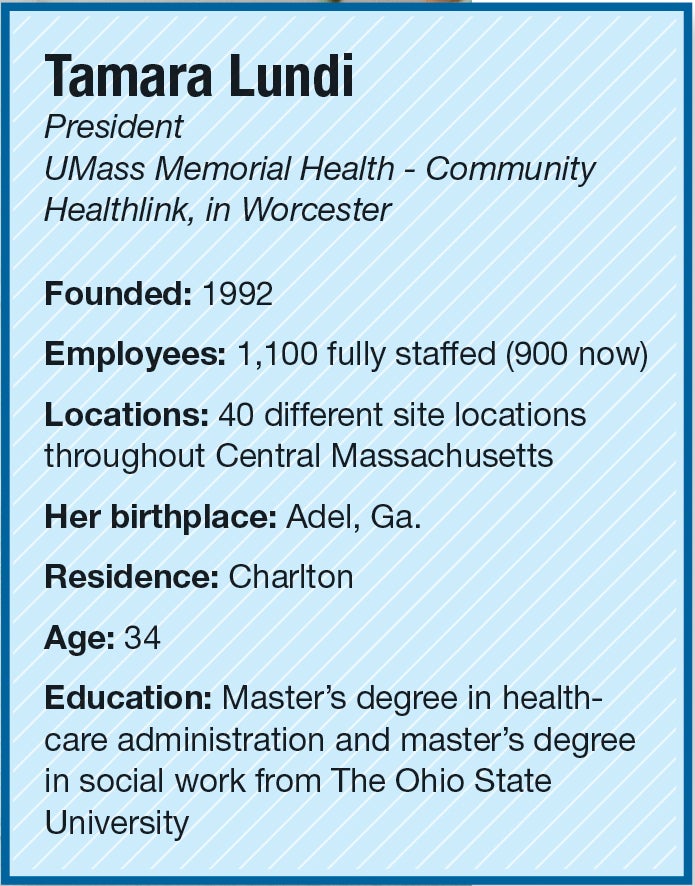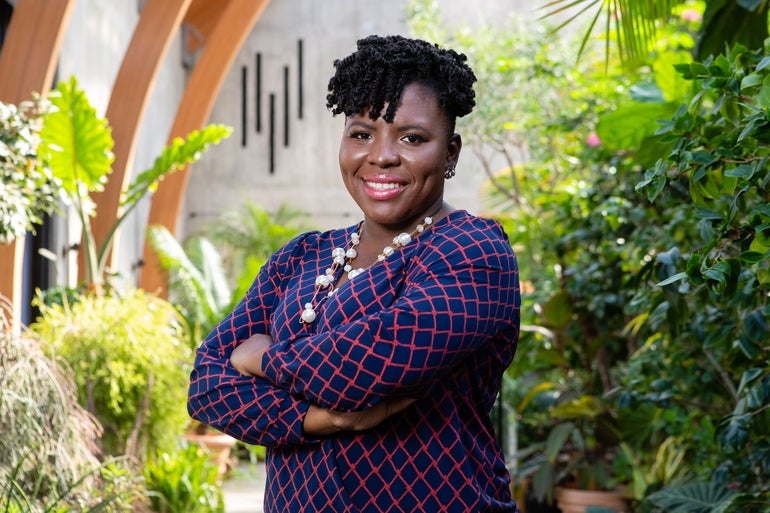Almost three years ago, Tamara Lundi took over leadership of Community Healthlink, the UMass Memorial Health division dedicated to improving the health of people suffering from mental illness, addiction, or homelessness.
Get Instant Access to This Article
Subscribe to Worcester Business Journal and get immediate access to all of our subscriber-only content and much more.
- Critical Central Massachusetts business news updated daily.
- Immediate access to all subscriber-only content on our website.
- Bi-weekly print or digital editions of our award-winning publication.
- Special bonus issues like the WBJ Book of Lists.
- Exclusive ticket prize draws for our in-person events.
Click here to purchase a paywall bypass link for this article.
Almost three years ago, Tamara Lundi took over leadership of Community Healthlink, the UMass Memorial Health division dedicated to improving the health of people suffering from mental illness, addiction, or homelessness. In late May, CHL was chosen by the City of Worcester to develop a new model for 911 calls, where CHL crisis teams accompany police officers to certain emergency calls, such as welfare or safety checks.

How’s your job been going?
It’s rewarding. I was in the role about three months before the pandemic, and it’s been quite busy ever since. It has been some of the most challenging times that any sector has faced, with behavioral health needs spiking. It was high before, but it skyrocketed during COVID. The demand increased while the supply decreased. Employees left the field, as people needed to get out when things were so strained. We are really seeing a crisis in the mental health field.
You’re shorthanded about 200 employees. Is it getting better?
In some areas, there is a slow progression of things ticking up. It has been better than it has been during the COVID surges. Those surges are more challenging: Staff is out with COVID, or patients have COVID. The workforce piece is better than it has been during those surges. We are getting more resumes through the door, but it is still a challenge to get the right people with the right skills in those roles.
Are you recruiting differently?
The virtual world really opened up during the pandemic, and that created a lot of opportunities for clinicians to basically work from anywhere. We work with a third party to recruit clinicians from across the country. They have to be credentialed in Massachusetts but can work from anywhere.
So, are you competing more against out-of-state employers?
It has been a net positive, although we are all competing for each other’s talent pools. Eventually, we will get back to somewhat of the pre-pandemic staffing norms, but not all the way since much has changed with the move to more virtual.
It sounds like you are working on some high-elevation changes to the behavioral health system, too.
We have applied to be the Community Behavioral Health Center destination in Massachusetts for this region. We are positioned very well to be approved for that. This is a statewide effort with the goal to provide urgent and emergent care in a timely manner, and come up with a payment system that supports that model.
This effort is connecting to the new 988 system, where we can provide immediate or timely care when needed.
What is 988?
Massachusetts is standing up a new hotline system, similar to when someone would call 911, it would be a 988 number for when someone is having a behavioral health crisis. It is part of a national effort, and the federal government estimates 80% of calls will be able to be resolved by clinicians over the phone, who can then make appointments if necessary with Community Behavioral Health Centers. It is exciting because you can see how the dots connect from the local level, all the way to the federal level.
With something like 988, the country is saying behavioral health is that important.
How does that tie into your 911 program with Worcester?
The goal is to launch the 988 and get more behind the scenes with how 911 and 988 are working together. What we are doing here in Worcester is positioning the city to be ahead of the game when those two lines connect on the federal level. The plan is to have those behavioral health groups who are working on the 988 calls be the same ones who are responding to the 911 calls.
The City of Worcester is taking the lead and can become the model for the rest of the state. Other states have similar models, too. Atlanta has been piloting this model for awhile, and Georgia just had a vote to take the program statewide. Police are beginning to see the value, as these programs roll out. Instead of someone being incarcerated or penalized for having a behavioral health crisis, we would work to resolve the large problems in ways that don’t necessarily have to lead to jail.
Worcester wants to take this even beyond that step, looking to not only respond to people while they are in crisis but what happens after that. We can connect people with substance-abuse programs, have parents and children who are having trouble at home connect with counselors.
It can really be a game changer for people who suffer from homelessness, addiction, and other behavioral health crises.
This interview was conducted and edited for length and clarity by WBJ Editor Brad Kane.

